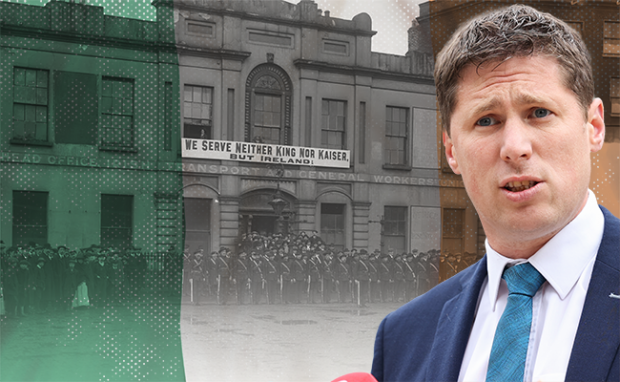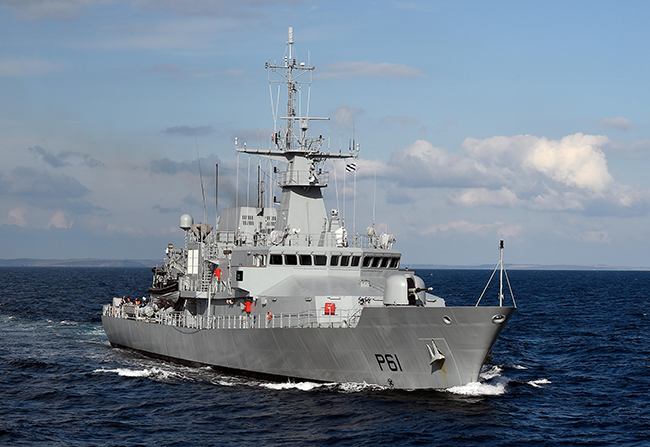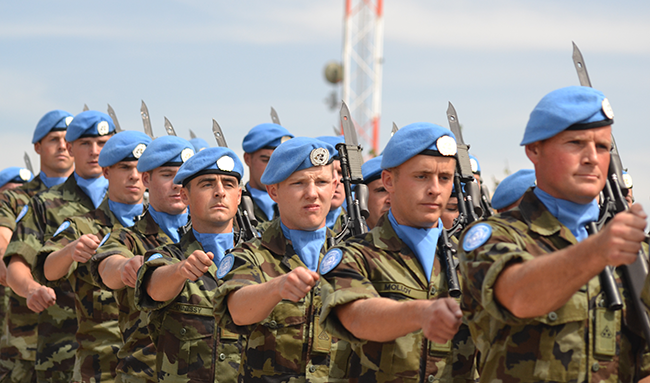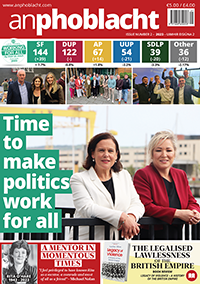27 June 2023
Military neutrality crucial to Ireland’s international roles

• Matt Carthy is a Sinn Féin TD for Cavan Monaghan and party spokesperson on Foreign Affairs & Defence
As the coalition government’s controversial and flawed Consultative Forum on International Security Policy finishes its public sessions today, we publish an article from the current issue of An Phoblacht by Sinn Féin TD Matt Carthy. He outlines Sinn Féin’s vision for Ireland playing a constructive role in the wider world, committed to diplomacy, humanitarianism, peace building, and cooperation with other states on global challenges.
• — • — • — • — • — •
Ireland’s neutrality has had a heightened media focus this year, as Irish society grapples with the impact of Russia’s illegal invasion of Ukraine and the coalition government continues to undermine both the state’s defence capabilities and the ‘triple lock’ mechanism for sanctioning peacekeeping missions. Matt Carthy outlines the Sinn Féin position.
• — • — • — • — • — •
During a debate on his proposed Consultative Forum on Security and Defence issues on 18 May, Tánaiste Micheál Martin told the Dáil that there was “no hidden agenda nor prejudged outcome” for the hearings which will take place this month.
Those who took the Fianna Fáil leader at his word will have been surprised to read in the following Sunday’s Business Post that “the three government party leaders have reached a consensus that Ireland’s ‘triple lock’ mechanism for peace-keeping missions needs to go”.
That, and subsequent government commentary, reaffirms the suspicion that the government’s proposed forum is less about public discussion than it is an attempt to reshape public opinion.
Government does not intend to provide a role for the Opposition in the Tánaiste’s proposed so-called Consultative Forum. This is an important point because decisions on Foreign Policy are different to other areas. When one government sign up to international agreements, for example, a successor government cannot always simply change position without damaging our international reputation.
Therefore, government cannot simply exclude Opposition from important information and discussions that could have an impact for generations to come.
Sinn Féin’s vision is for Ireland to play a constructive role in the wider world, committed to diplomacy, humanitarianism, peace building, and cooperation with other states on global challenges including poverty, world hunger, climate change, conflict resolution and migration.
An independent foreign policy and military neutrality are crucial to allow Ireland to play that important role in the wider world. We should be proud of our military neutrality, and resist attempts by some to recast it as a weakness or a failing.
The legacy of Irish neutrality has been our contribution to making the world a better and a safer place and is one which we should be proud of.
Sinn Féin welcome renewed discourse on foreign, security, and defence policies. In the past, Irish governments have made important, often crucial decisions, with little engagement with the Irish public and often even minimal Oireachtas debate.
The starting point to any such discourse must be a recognition that military neutrality has served this state well and it is incumbent on those of us on the left who value neutrality to then articulate the positive and constructive role that neutrality can help Ireland play internationally.
It is arguable that no government has clearly articulated Irish neutrality since the time of Frank Aiken, whose work defined Irish foreign and defence policy for generations.
It was Ireland’s position as a neutral and our unique experience of colonialism that allowed us to earn a reputation as one of the pre-eminent contributors to peacekeeping in the globe.
It has been a positive force for good, allowing this small country to play a bigger role in the world than many others with much greater wealth and much bigger military machines.
That is the legacy of those who first defined neutrality. Our objective must be to build on that legacy for generations to come. That is why, in any public discussion, we will vociferously advocate for neutrality.
The illegal Russian invasion of Ukraine has changed the world.In that context, it is incumbent upon us to reflect upon our responsibility to safeguard our country and our citizens, to reflect on how we uphold the principles of democracy and the rule of law, and contribute positively to the world beyond our borders through humanitarian and development aid, peacekeeping, and acting as facilitators of peace where conflict does exist.
For my part, I remain as convinced as to the imperative of Irish neutrality, to Irish participation in UN peacekeeping missions, and as proud as before of Ireland's humanitarian record.

• Successive governments have underinvested in our Defence Forces and we are unable to monitor, never mind defend, our own airspace or seas
For their part, the truth is that over the past two decades, at least, successive governments have undermined Irish neutrality.
Firstly, governments have moved us away from having an independent foreign policy. So it is that the rightfully strong rhetoric and actions regarding Ukraine – being as they are in tune with those of larger Western states – are not matched in other areas where they are equally deserving, such as Palestine.
Secondly, successive governments have overseen the systemic underinvestment in our Defence Forces. We are unable to monitor, never mind defend, our own airspace or seas, and are unable to secure ourselves against modern threats, while numbers within the Defence Forces have reached critically low levels.
Thirdly, Fianna Fáil and Fine Gael governments have used membership of NATO’s Partnership for Peace and PESCO as mechanisms to further undermine neutrality.
These actions impact on each other. When Irish Ministers sign us up to international missions, even those with UN mandates, they often do so at the cost of Irish defence, such as when there will be periods this summer when there will be only a single navy vessel operating in Irish waters.
Sometimes contradictory government responses to media reports of a secret deal with the British government to have the RAF secure our airspace again starkly points to an ongoing policy of signing up to international military missions while ignoring the incapacity to address domestic needs.
Sinn Féin understands the obligations of government in respect of agreements made with international partners. That is why I have said that, in government, we will not withdraw Irish forces from pre-committed operations and exercises.
But, in terms of future decisions, we will take a different approach than the current government, one which will have the unequivocal starting point that we are a neutral and independent state, with the objective of building upon our proud tradition of participation in UN peacekeeping missions and in supporting conflict resolution across the globe.
The alternative trajectory is one that would place Irish Defence Forces personnel under the command of an EU military structure whose deployment could occur without the approval of the Dáil, government or UN mandate as required by the ‘triple lock’.
That has been the ambition of some within the EU for some time and is the natural outworking of the stated position of those within Fine Gael and Fianna Fáil who want to undo our traditional military neutrality.
It is the ongoing failure of government parties to accept the premise that Irish neutrality has served us well that has led to much cynicism about the proposed Consultative Forum on International Security, which minimises the input of the public and opposition parties. Those contributing will be appointed by government, and their contributions will lead to a report authored the forum’s chair, also appointed by government.

• We have a proud tradition of participation in UN peacekeeping missions and in supporting conflict resolution across the globe
Many, myself included, fear that the forum is a blatant attempt to undermine neutrality. Should government wish to establish a consultative mechanism for debate, outside of a referendum, the appropriate format would be a Citizen’s Assembly.
Regardless, Sinn Féin will engage with the forum and outline our clear positions on Irish international security policy, including measures to ensure public inclusion in debate, enhanced Oireachtas oversight of any further proposed military entanglements, and the rebuilding of our Defence Forces.
What those who misconstrue our commitment to neutrality as isolationism miss is that it has been our neutrality and our independent foreign policy that led President Biden recently to recognise Ireland’s “moral authority” around the world.
That moral authority is something worth cherishing because it is the legacy of people such as Aiken and former Minister Seán MacBride, International Chair of Amnesty International, recipient of the Nobel Peace Prize, and a signatory to the European Convention on Human Rights.
Those of that generation will have recalled that famous banner hanging from Liberty Hall that ‘We serve neither King nor Kaiser, but Ireland’.
And it is with that ethos, Ireland as an independent state, operating an independent foreign policy as endorsed and respected by the international community, that we can advance the Irish legacy of delivering humanitarian aid, build on the renowned reputation of our peacekeepers and make a stand for the Palestinian people and others repressed through occupation and apartheid.
This is the vision of neutrality that Sinn Féin will bring to every debate, and one I am proud to champion.
Sinn Féin want Ireland to be a voice against oppression, poverty, and war. To be the international champion for peace and disarmament and multilateralism.
We want Ireland to use our history to ensure that this planet has a better future.

Get the latest issue of An Phoblacht > here
Follow us on Facebook
An Phoblacht on Twitter
Uncomfortable Conversations

An initiative for dialogue
for reconciliation
— — — — — — —
Contributions from key figures in the churches, academia and wider civic society as well as senior republican figures





